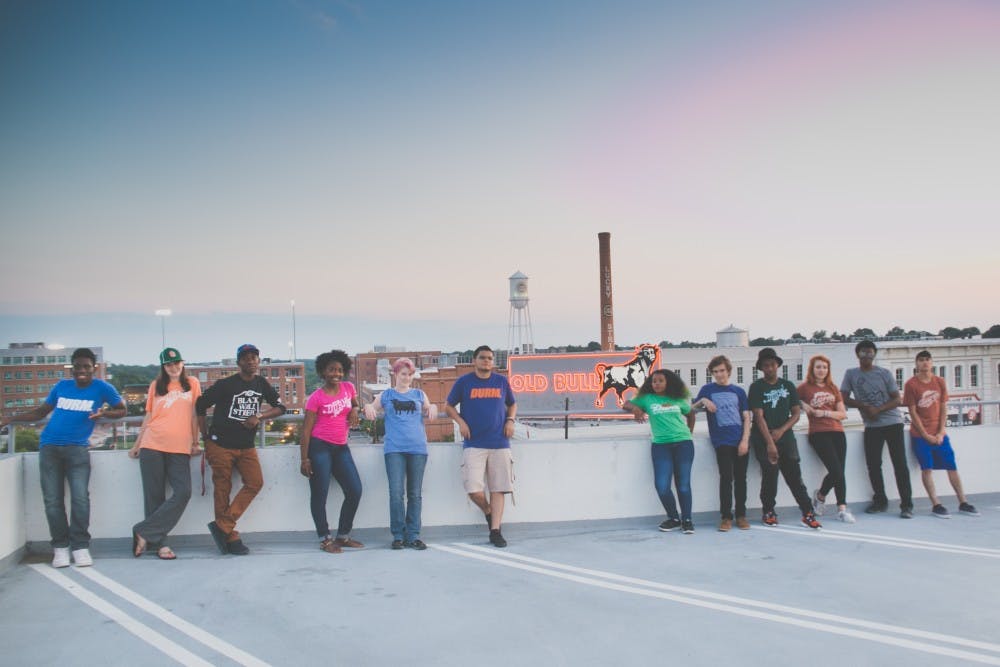Some of Durham’s oldest stories are being told through some of the city’s youngest residents this summer.
The Bull City Dignity Project—facilitated by senior Kari Barclay and junior Lara Haft and funded by the Kenan Institute for Ethics at Duke—brought ten local high school students together to create a documentary theater performance that pieces together parts of Durham’s history to create a powerful collection of untold narratives.
The performance is in the form of continuous and overlapping monologues—some of which interact with each other—that directly tell stories from Durham residents who were interviewed by the students as a part of the program this summer.
“The show is real words of community members all about Durham history,” Barclay said. “It’s about telling true stories in people’s own words.”
The ten students in the project as well as Haft and Barclay conducted a series of more than 20 interviews with community members and activists, many of whom the students knew through pre-existing relationships and with whom the students built a relationship of trust as documentarians of their lives and stories.
“You have so many different stories to share and everybody wants to tell their own story.” Barclay said. “It was lot of late nights of editing and piecing all the pieces together to figure out how to these stories intersect.”
Barclay said that while he and Haft facilitated the program and help to conduct interviews, transcribe and refine the written parts of the performance, the high school students were the primary interviewers and shapers of what the show would ultimately become and ran the talkback discussion after each performance.
The students decided which of themes to focus on in the show out of the stories told in the transcripts of interviews, ultimately presenting a variety of topics including economic development, LGBT life and civil rights history among other intersectional subjects.
The students, who auditioned and interviewed to be a part of the project, came from several high schools in the area and many from theater or poetry backgrounds like the facilitators.
“So much of the program was run by the students,” Haft said. “We really lucked out with the group that we had.”
Haft noted that although the show covers many topics including some that are not often front and center issues, the narrative was not a complete one. Wanting to avoid misgendering or misrepresenting some of the storytellers, she said, was a consideration in choosing which issues and narratives to include or not include.
“We were bringing in some stories from the margins to the center,” she said. “But it’s not a people’s history of Durham.”
Haft noted that the students were using a college-level methodology of conducting interviews and documenting the narratives. The students, coming from a diverse socioeconomic backgrounds, could have the experience of participating in theater and gaining stage experience while also studying ethical issues at a college level without paying to participate in costly summer performance programs.
Barclay and Haft originally connected over a shared interest in storytelling, with Haft’s background coming from spoken word poetry and Barclay’s from directing and acting in theater.
“We thought how can we apply our skills more at home in a way we can make a play that’s really by Durham, of Durham and for Durham,” Barclay said. “We brought up the idea of why Duke students have to go abroad to make a difference.”
Barclay also emphasized how a disparity exists between new residents—and Duke itself—who tend to value the city for its innovation, arts and food scenes and overall new and developing culture, and those who value and want to preserve the history of it.
“A lot of residents who have been here for a while like the black communities here say, ‘Hey, we’ve been here forever. Look at Durham, look at the history of Black Wall Street, look at the civil rights activism. Durham is ours and you’re taking it away from us,” he said. “These stories are all a way for people to claim Durham as their own.”
The show was performed earlier in August at the Hatyi Heritage Center as well as the Pinhook in downtown Durham. There will be a final performance at Duke in the Nelson Music Room Aug 30. Ticket sales have been run as a pay-what-you-can donation format, Haft said, funding future events and programs with the Bull City Dignity Project.
Though the performance at Duke will be the last in this incarnation, Haft said that it has the potential to live on in some capacity such as a video documentary project.
“Next year I’ll be acting as the program coordinator and the students acting as directors and have creative control.” she said. “It’s a very exciting thing.”
Get The Chronicle straight to your inbox
Sign up for our weekly newsletter. Cancel at any time.

